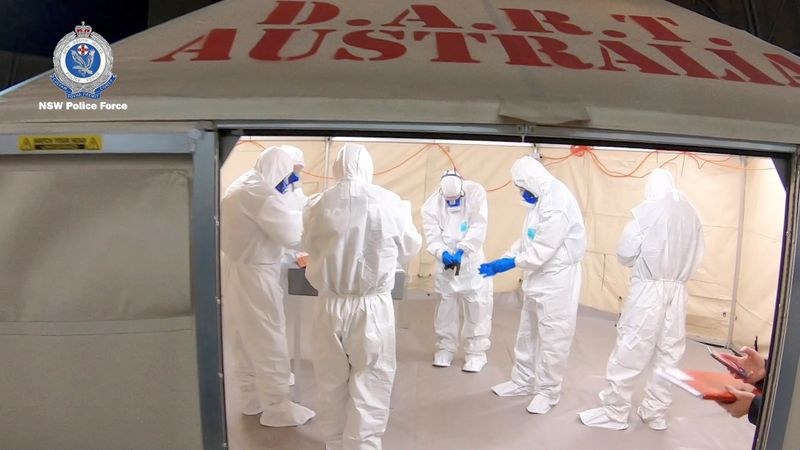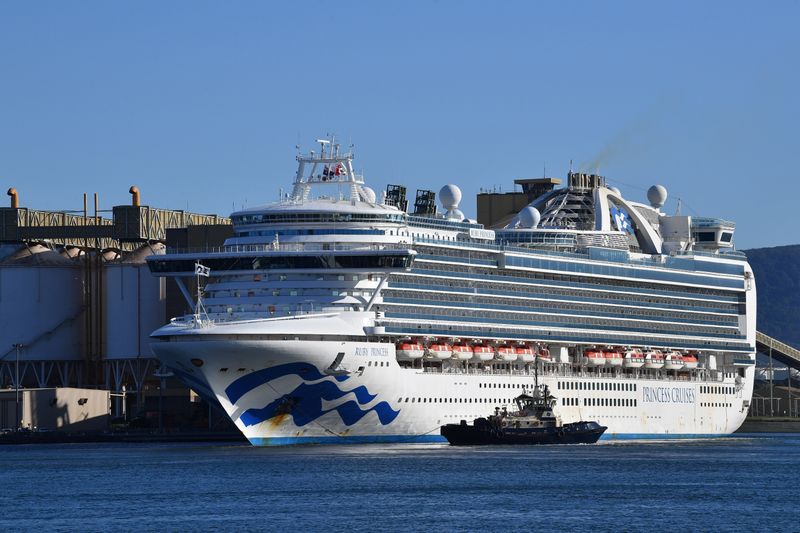By Byron Kaye
SYDNEY (Reuters) - Australian police said on Thursday they have taken the "black box" of a cruise ship which disembarked hundreds of passengers infected with the coronavirus in Sydney, as part of a homicide investigation into the country's deadliest infection source.
The investigation got underway as the Australian authorities said the rate of new coronavirus infections hit its lowest number in three weeks and began arranging more flights to bring home citizens stranded abroad.
The Ruby Princess cruise ship, owned by Carnival Corp (N:CCL), has become a flashpoint of public anger in Australia after authorities granted the ship permission to disembark its passengers last month without health checks.
Hundreds of the passengers later tested positive for the coronavirus and 15 have died, out of Australia's roughly 6,000 confirmed cases and 51 deaths.
Investigators boarded the ship at an industrial port south of Sydney, interviewed the captain and took electronic logs as evidence, New South Wales (NSW) state Police Commissioner Mick Fuller said.
"They spoke to the captain of the ship, who was extremely helpful," Fuller said in a televised news conference on Thursday.
"Ships have a black box very similar to that of international planes, and that and other evidence has been seized for further investigation."
About 1,000 crew of various nationalities remain on board the ship.
Globally, more than 1.5 million people have tested positive to the coronavirus, which has caused about 87,000 deaths.
CASES DROPPING
In the past day, Australia recorded 96 new coronavirus infections, its first increase of less than 100 cases in three weeks, Health Minister Greg Hunt told reporters in Canberra.
"The curve continues to flatten, we are consolidating the gains," Hunt said in a televised news conference.
"While we have been cautious over the last two weeks as we have seen the early data, what we're seeing now is a genuine consolidation."
Authorities are imploring people to stay home and cancel trips to traditional vacation spots over the long Easter holiday weekend and say tight restrictions on movement could stay in place for at least six months.
The restrictions include a broad order for people to stay home except for essential work or to exercise and buy food, and police have said they will use the threat of on-the-spot fines to stop people travelling or socialising over Easter.
"We can't lift our foot off the pedal, we need to stay vigilant, make sure we clamp down on the community-to-community transmission," NSW Premier Gladys Berejiklian told reporters.
Berejiklian ordered a senior state lawmaker back to his Sydney home after he was photographed by local media at his beach house outside the city.
The premier of the island state Tasmania, Peter Gutwein, said he would use helicopters and doorknocks of suspected holiday houses to monitor people's movements.
"The gloves come off, we are going to police this, the period of education is over," he said.
Federal Foreign Affairs Minister Marise Payne said she had arranged with Qantas Airways Ltd (AX:QAN) to run special flights to repatriate Australians stuck in foreign countries.
The flights would carry people in Peru, Argentina and South Africa home in the next week, with flights also being planned from India and the Philippines.
Late on Wednesday, the federal government approved a package to subsidise the wages of six million people, or a quarter of the population, at a cost of A$130 billion ($81 billion).
Interactive graphic tracking global spread of coronavirus: https://graphics.reuters.com/CHINA-HEALTH-MAP/0100B59S39E/index.html

